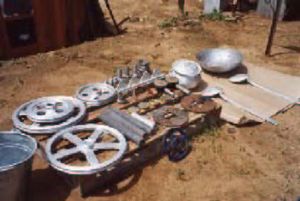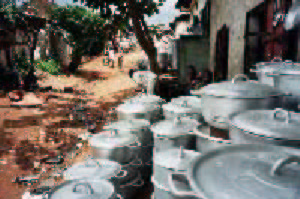
Technical manual on the recovery of aluminum in artisanal developing countries
C.de Gh.Bulteau Kerchove
A. J. Divry Tchoufang
G. Van den Bossche
Ingénieurs Assistance Internationale - Ingénieurs sans Frontières http://www.isf-iai.be mail@isf-iai.be Avenue du Marly 48, 1120 Brussels - Belgium
Collaborators[edit | edit source]
Were associated with the development of this guide and its correction:
- Gh. Bulteau (Fr), Engineer, Baudelet s.a., Technical Director of a aluminum refinery
- C.de Kerchove de DENTERGHEM, (B), I.C.Mét., Foundry of Lion s.a.
- A. Divry, Professor, Manager, of the foundry Divry Bertrand, aluminum foundry
- V.Gilard, (B), I.C.Ch., Ingénieurs sans Frontières
- L. Lepot, (B), President of the Group Foundry Wallonia-Brussels
- J. Tchoufang (Cam.), I.C.M.E., University of Liege
- G. Van den Bossche, ICMét., Ingénieurs sans Frontières, chief of Al. Project
Were involved in tests carried out in Belgium, France and Cameroon:
- V. Acha, (Cam) Engineer, Ingénieurs sans Frontières
- L. Bertrand, (B) Head of Workshop, Foundry Divry Bertrand
- Gh.Bulteau, (Fr) anc.professeur, Lycée Technique Armentières
- JMEtobe (Cam) University Engineer, Ingénieurs sans Frontières
- D. Ngantsengué (Cam), President of the Assaretra
- S. Pierre, Technician-founder, Assaretra
Introduction[edit | edit source]
Aluminum is a metal with a low melting point (~ 650 °C) which can be already made in relative simple installations and foundries where the bodies of machines, household objects and other decorative objects can be cast at a low production cost. In particular in many countries of sub-Saharan Africa, small artisanal foundries make objects by casting aluminum into molds in natural sand, also called <<à vert >>; sand is also very wet, in a very humid climate.

The manufacture of aluminum kitchen utensils by these <<à vert>> sand molding techniques is widespread in sub-Saharan Africa for several reasons:
- Production process is accessible without extensive personnel training or startup capital, nor significant operation funding for a company whose cash reserves are often inadequate and occasionally negative.
- Melting temperature is relatively low, hereby not requiring any complicated or expensive installation.
- Availability of raw materials, common and easy to acquire; often from scrap of which the collection is done by a labor force made up of jobless people.
- Secondary materials - simple refractory -basically clay- required for the manufacturing of the furnace and equipment, usually present in abundance, provided that onr satisfies himself with medium quality when compared to the same utensils made in stainless steel.
- Local manufacturing, close to the distribution channels which are the local outdoor markets.
- Low vending price and thus possible for a sale with often rural customers.
- Possibility of recovery of domestic waste production.
A number of artisanal foundries work from a cheap raw material collected from aluminum landfill and melt the scrap in a melting pot furnace.